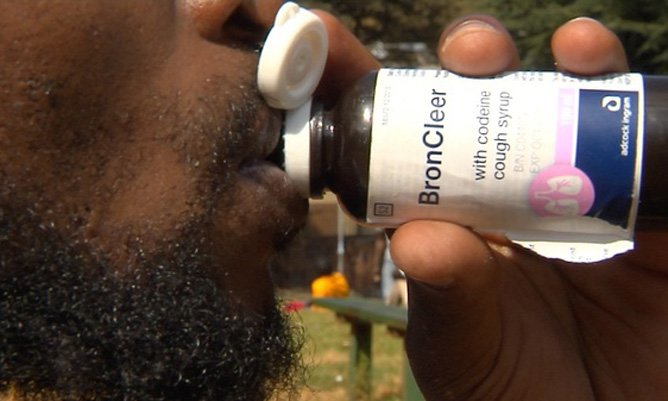At the height of his addiction to BronCleer, Kuzivakwashe Mhlanqa drank four bottles of the cough syrup a day, and even stole money from his mum to feed his habit. Eventually, the 19-year-old moved out of the family home in Zimbabwe's capital, Harare, and started living on the streets.
"I wasn't me. I was someone else," he says. His mother, Linda Masarira, is also here in the family living room listening to her son. She is a single mother of five struggling to get by. "He would come home from school, sit by the dinner table and stare blankly into space. He wouldn't answer if you spoke to him. That's the affect BronCleer has on you," she tells me.
Throughout Harare, the streets and gutters are littered with empty brown bottles – a sign of the addiction crisis the nation is failing to handle. Among other ingredients, BronCleer contains codeine and alcohol. In small doses, the cough syrup provides pain relief, works as a mild sedative and is relatively harmless. But continuous abuse will lead to permanent organ damage and can result in death. The drug is sold on every street corner, in bars, schoolyards and on buses for as little as $3 (£2.40) a bottle.
Four years ago, Zimbabwe passed a ban on BronCleer, but the cough syrup is still smuggled into the country in large quantities from neighbouring South Africa. And because it's a cheap and easily attainable high, it has come to represent an irresistible escape for many people in the country who struggle to see a future for themselves.
Demographically, Zimbabwe is a country of young people – according to thecountry’s 2012 census, 77 percent of Zimbabwe's approximately 13 million inhabitants are below the age of 35. And the younger generations of the country are still suffering in the aftermath of Robert Mugabe's regime. Even though the 94-year-old left office last year, the economy is still in ruins. Social issues and mass-unemployment plague Zimbabwe – the numbers have been contested, but some believe as many as 90 to 95 percent of Zimbabweans are in informal, temporary jobs.
Today, Kuzivakwashe Mhlanqa is clean. He's currently working on producing his own music – a job he says helps him manage his addiction as he tries to be a positive role model to his four younger siblings.
But millions of people in Zimbabwe are still fighting off the addiction and, unfortunately, their government is largely ignoring the issue. The official strategy on drug abuse is one that relies on incarceration and forceful medication of addicts until the physical withdrawal symptoms subside.
According to Robin Nandusa, head of the Zimbabwe Civil Liberties and Drug Network, one of the few NGOs in the country lobbying for better treatment options for addicts, this strategy is hopelessly flawed. "In our NGO we are working to change the current drug laws. We want addicts to be able to receive proper treatment," he says.
There are no official surveys outlining the extent of the drug abuse crisis in Zimbabwe, but Robin Nandusa estimates – based on figures gathered through his own organisation – that more than half of the country's young people are abusing drugs, while other sources claim this figure is even higher.
Since the making of this documentary, the Zimbabwean government has announced plans to open new rehabilitation clinics around the country. But so far, politicians have yet to find a viable solution for the problem of millions of young people dependant on BronCleer. – Vice.com




